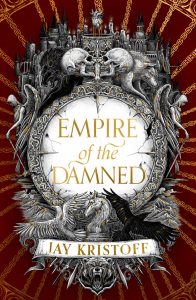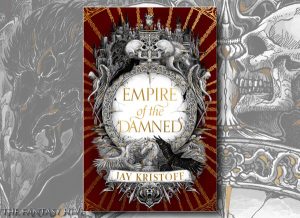EMPIRE OF THE DAMNED by Jay Kristoff (BOOK REVIEW)
A sequel that doubles down on everything great in Empire of the Vampire, while breaking you at the end of it.
It’s sometimes a blessing to enter a series late – the sequel is already ready, and you don’t have to wait for it for a long time. The moment I finished Empire of the Vampire (EoTV), I had to start Empire of the Damned (EoTD) immediately and I am immensely pleased to report that not only does the sequel ascend new heights, it’s also a book that avoids the middle book syndrome by completely leaving Gabe and the reader broken while signaling the endgame of the series.
I have tried to keep this review as devoid of spoilers as I can, but there will be mild spoilers for EoTV – spoilers that are already highlighted if you read the blurb of book two.
Final warning: do not read further unless you have read EoTV or the blurb for EoTD. From here on, proceed at your own peril, like vampires in sunlight.
“You are not a bad man, Gabriel De Leon. Sometimes you simply do bad things”
The tableau at the start of the EoTD draws parallels to EoTV – Gabriel De Leon, the last Silversaint, being interviewed by Jean-Francois, the chronicler of the Blood Empress Margot Chastain, one of the four vampire emperors, wanting to know more about the fate of the Holy Grail. This time around, as befits a middle book, the world expands, and we start to get a glimpse of the politics at play even within the vampire clans, and therein lies the urgency and importance of knowing the Grail’s fate.
“That’s what frightens me the most, you know. The thought that grief is the only thing I have left of them. And once that fades, the last of them will too. The world feels half-full without them. I miss them like a piece of me is missing. But I honestly don’t know what hurt more. Holding on to them or letting them go”
 There are bound to be inevitable comparisons with EoTV. EoTV had a sense of urgency to it right from the beginning, while EoTD takes a gander about in its initial parts. This allows for the characters to be introduced and chemistry to build up. The emergence of the mysterious vampire, Liathe, with promises to solve the mystery of the Grail and save the world, places her in a tenuous alliance with Gabe. The fact that she has a shared history with Gabriel works in her favor, while her being a vampire obviously doesn’t. This leads to a lot of back-and-forth arguments and disagreements as they try to plot out the best course of action to save the world. Gabriel’s former apprentice, Lachlan, and a member of Gabriel’s prior Grial mission, Phoebe, also join this crew, each having an important role to play.
There are bound to be inevitable comparisons with EoTV. EoTV had a sense of urgency to it right from the beginning, while EoTD takes a gander about in its initial parts. This allows for the characters to be introduced and chemistry to build up. The emergence of the mysterious vampire, Liathe, with promises to solve the mystery of the Grail and save the world, places her in a tenuous alliance with Gabe. The fact that she has a shared history with Gabriel works in her favor, while her being a vampire obviously doesn’t. This leads to a lot of back-and-forth arguments and disagreements as they try to plot out the best course of action to save the world. Gabriel’s former apprentice, Lachlan, and a member of Gabriel’s prior Grial mission, Phoebe, also join this crew, each having an important role to play.
“Gabriel’s great love has never been liquor, nor licentiousness. It is lying”
If EoTV had the advantage of non-linear storytelling to enhance the narrative, EoTD leans into the introduction of an additional narrator to do the same. From the previous part, we have come to see that Gabriel has a tortured, broken lead with a penchant for melodrama. The introduction of this other narrative tells us how it is rooted in how Gabriel perceives things and how much of it is actually true. That lends an interesting Rashomon-ic quality to the storytelling as we see the same story unfold from two different viewpoints and come to realize how much of an unreliable narrator Gabriel actually is.
“Before he burns his bridges, a man should learn to swim”
Gabriel has many flaws, but he has this adage that his friends are the hill he’ll die on. This second PoV has no such compunction, and therefore the narration from her standpoint presents a different and more chilling way of doing things. She is almost fanatical in her dedication to the completion of the mission and therefore does what is best for it without any other consideration. This, combined with her secretive nature, leads up to an unexpected, unseen twist around 30% into the book, which then propels the book onto a new level.
“That which was lost, found. That which was found, lost”
This allows the story to spend time exploring the Vampire houses and the tensions existing between them, especially on account of how their power works and how they are willing to exploit humanity. Blood Voss is the vampire house we encountered in the previous book, and this time around, it is Blood Dyvok. Blood Dyvok with their power hits particularly hard on Gabe’s allies, most of whom are captive under them. That part of the story is particularly brutal on Gabe’s closest friends, Aaron and Baptiste. However, this is also the part of the story where the Grail’s power and heritage begin to take center stage. The Blood Dyvok sequences are quite bleak, unabashedly horny, and nihilistically brutal. In a way, this is where the intrigue takes over the action as Gabriel has always been a hammer in search of a nail, and his absence allows for stealthy plotting to fight against the Dyvok brother-sister ruling pair. A fascinating play that occurs is not just the struggle between the different vampire houses but also within each house as well, and nowhere is it starker than Blood Dyvok. In a way, this is a great way to introduce a pretty crafty change of pace without letting go of the bloodshed.
“You people only believe our new world cruel, because in it, for the very first time, thou art the prey”
Religion and Prophecy start to take center stage in the other branch of the story that follows Gabriel. The Empire of the Vampire series has been deeply entwined with religion, with the Redeemer being the central religious Christ-equivalent of this world. The mysteries related to the Redeemer’s death and his bloodline increasingly come into prominence. The prophecy element starts to stack up in this world, but again, given this is Kristoff’s writing, nothing is straightforward, especially prophecy. What Kristoff does well is to show how prophecy means different things to different people, and nowhere is it more relevant than with the duskdancers (basically “were-animal” clans) whom Gabriel tries to strike an alliance with. This is an interesting conundrum, as Gabe has a long history of animosity with the duskdancers, but is also one of the pivotal moments of the book. In what would make the Game of Thrones sexposition sequences blush, Kristoff gives Gabriel some heavy-duty (panting) moments of sexual tension and release while introducing key revelations. And this plays into much to the amusement and frustration of the vampire chronicler, Jean-Francois, who, with no great subtlety, lets Gabriel know how much he would also relish the opportunity to get to “know” Gabe better.
“The greatest wickedness is always done for the good, is it not? But what a relief it is, to learn that the Almighty’s soldiers are just as hypocritical as the rest of us”
Both threads eventually come together in a stunning, chaotic finale where the fog of war makes the narrative even more unreliable, amidst some of the most brutal, bloody action sequences. There are tensions due to the built-in, barely suppressed animosity between the narrators that result in calamitous choices and betrayals. The climactic confrontation is fantastically written and wrought in blood with many a poetic description of the violent bloodletting that happens across multiple characters. Confrontations between the Dyvok clans and our bunch of “heroes” are gory in how the dismantling happens, and even then, the author allows for some fabulous quiet moments to be baked in, proving that sometimes a heart is mightier than a war hammer. The twists and the counter-twists do keep on coming, resulting in fabulous highs and lows for all characters. Just when all hope seems lost, things turn, and just when everything seems won, hearts are broken. There is a savage, atavistic, primal quality to the battle that takes place, and it does leave you, as a reader, both exhilarated and exhausted.
“To hate the thing that is completing you. To love the thing that is destroying you. What perfect suffering. What hell divine.”
However, the sting really is in the tail. It’s not the large-scale violence that breaks Gabriel; it is what happens in the dying moments of the battle, where the action shifts to the catacombs. The consequences of the choices, the assorted betrayals, and the shared history between the narrators are laid bare. Gabriel breaks at the end of all that, as a result of both his impulsive actions, blinded by love and rage, and the resultant reactions from the others. While what follows is entirely in line with how religion and faith are prevalent in this world, it is still in Gabriel’s journey that we are interested in, and this is where we get the sense of the endgame that the author has planned for us.
“Though they are as far apart as dawning and dusk, Historian, moments and lifetimes have one thing in common – They never last”
EoTD is the middle book of the series, and more often than not, middle books try to set things up without accomplishing much on their own. In this case, however, EoTD achieves a lot on its own. It may be a middle book, but it allows for significant story progression at an individual level with fantastic revelations and delicately painful and tragic moments of growth for the lead characters. While the plot progression with regards to the overall threat has still not happened, this middle book emphasizes the journey element brilliantly while setting up the stakes for the third book, both in the form of actions and characters.
“When someone you love is taken from you, their memory is all you have left, and sharing that memory can make it somehow feel less… yours. As if you’re giving away a piece of it, and a piece of the person you lost besides”
Empire of the Damned is a fantastic sequel that is a rare in that it one-ups its predecessor in every count. The writing is better, the plotting is massively layered, and the characters go through even more of a hell than Empire of the Vampire. It’s even more violent and hornier than the previous book and is extremely unapologetic about it. At the same time, it also starts to expand the world while setting up the table for the final book. Empire of the Damned is ultimately about love, hope, faith, belief, and redemption at the depths of despair and at the mountain of addiction and thirst.
Rating – 5 Unreliable Narrators on 5
Empire of the Damned is available now – you can order your copy on Bookshop.org

